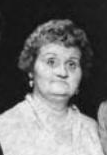Eunice K. Fiorito (October 1, 1930 – November 22, 1999) was an American disability rights activist and social worker. She was president of the American Coalition of Citizens with Disabilities (ACCD).
Eunice K. Fiorito | |
|---|---|
 Eunice K. Fiorito, from a 1979 publication of the U.S. Department of Health, Education, and Welfare, Rehabilitation Services Administration. | |
| Born | Eunice Kathleen Frelly October 1, 1930 Chicago, Illinois, US |
| Died | November 22, 1999 Alexandria, Virginia, US |
| Occupation(s) | Disability rights activist, social worker, government official |
| Known for | President, American Coalition of Citizens with Disabilities |
Early life and education
editEunice Kathleen Frelly was born in Chicago, Illinois,[1] the daughter of Joseph Frelly (born Frelichowski) and Anna C. Rutkowski Frelly.[2] She became blind in her teen years.[3] She completed undergraduate studies in education at Loyola University Chicago in 1954, and earned a master's degree in social work at Columbia University in 1960.[4][5]
Career
editTrained as a social worker, Fiorito worked in the Illinois Department of Social Welfare and at the Jewish Guild for the Blind in New York City, where she helped start an outpatient psychiatric clinic for disabled children in the 1960s.[6] She was active in the American Council of the Blind.[4]
In 1970, Fiorito was appointed to the staff of mayor John Lindsay's Committee on the Handicapped, when she developed the idea of a city office for disability issues, especially building employment opportunities.[7][8] The Mayor's Office of the Handicapped in New York City opened in late 1972,[9] with Fiorito as its first director.[10][11] "I shall represent the disabled to this government, not this government to the disabled," she declared at her appointment.[12]
Fiorito testified at a Congressional subcommittee meeting on the Supplemental Security Income (SSI) program in 1975.[13] With Judith Heumann, Fred Fay, Ralf Hotchkiss, Lex Frieden, and others, she co-founded the American Coalition of Citizens with Disabilities in 1975,[14] and served as its president,[15] with Frank Bowe as ACCD's executive director. She was one of the leaders of the 504 Sit-In protests in 1977, and her experience working with both government officials and activists was important to the protests' successful resolution.[10] In 1980, she founded the League of Disabled Voters.[16]
Fiorito worked in Washington, D.C. at the Department of Health, Education and Welfare for nineteen years, beginning during the Carter administration. She was vice-chair of the federal task force on Section 504 of the Rehabilitation Act. She retired from government work in 1996, but continued to lead the Alexandria Commission on Persons with Disabilities, and do publicity for the Alexandria League of Women Voters.[4]
Personal life
editEunice K. Frelly married James Fiorito.[2] She died from heart failure in 1999, aged 69 years, at her home in Alexandria, Virginia.[4][17] Her grave is in Arlington National Cemetery.[18] Her family gave digital magnifiers to "service agencies, libraries, and other organizations" in her memory.[19] There is a Eunice Fiorito Scholarship given by the American Foundation for the Blind and the American Council of the Blind, for blind students studying advocacy or disability services.[20]
References
edit- ^ Keith, Billie Jean (January 2000). "Eunice Fiorito: A Voice that Should Never Die". The Braille Forum. 38.
- ^ a b "Anna C. Frelly (Frelichowski)". Chicago Tribune. 1973-04-22. p. 36. Retrieved 2020-07-04 – via Newspapers.com.
- ^ Baker, Ann (1979-05-27). "Blind woman fights for rights". Austin American-Statesman. p. 63. Retrieved 2020-07-04 – via Newspapers.com.
- ^ a b c d Estrada, Louie (December 3, 1999). "Eunice Fiorito, Advocate for Disabled". The Washington Post. Retrieved July 4, 2020.
- ^ "Wins Award Presented for Aid to Blind". Chicago Tribune. 1958-07-31. p. 13. Retrieved 2020-07-04 – via Newspapers.com.
- ^ Cannel, Ward (1963-09-19). "Who Helps Children in Darkness?". The Palm Beach Post. p. 48. Retrieved 2020-07-04 – via Newspapers.com.
- ^ McCarthy, Sheryl (1976-06-24). "800 Disabled but Willing Get a Shot at Job Market". Daily News. p. 126. Retrieved 2020-07-04 – via Newspapers.com.
- ^ "New York City Has Disabled Citizens' Opportunities Week". The Deaf American. 29: 19. November 1976 – via Internet Archive.
- ^ "City Post Filled by Mrs. Fiorito". Daily News. 1973-05-22. p. 69. Retrieved 2020-07-04 – via Newspapers.com.
- ^ a b Fleischer, Doris Zames; Zames, Fleischer Doris; Zames, Frieda (2012). The Disability Rights Movement: From Charity to Confrontation. Temple University Press. p. 52. ISBN 978-1-4399-0421-3.
- ^ Corry, John (1975-02-19). "About New York". The New York Times. ISSN 0362-4331. Retrieved 2020-07-04.
- ^ "Blind Director to Aid Disabled". Press and Sun-Bulletin. 1973-05-22. p. 6. Retrieved 2020-07-04 – via Newspapers.com.
- ^ United States Congress House Committee on Ways and Means (1975). Supplemental Security Income Program: Hearings Before the Subcommittee on Public Assistance Of..., 94-1...
- ^ Verville, Richard (2009-08-16). War, Politics, and Philanthropy: The History of Rehabilitation Medicine. University Press of America. p. 198. ISBN 978-0-7618-4595-9.
- ^ Boyd, Karen (1977-12-15). "Social Worker Lobbies For Rights of Disabled". Arizona Republic. p. 101. Retrieved 2020-07-04 – via Newspapers.com.
- ^ "Unit for Disabled Formed". Star-Gazette. 1980-03-29. p. 4. Retrieved 2020-07-04 – via Newspapers.com.
- ^ Duffy, Yvonne (1999-12-05). "Disabled in America: Disabled Community Loses 2 Champions". Detroit Free Press. p. 96. Retrieved 2020-07-04 – via Newspapers.com.
- ^ "Arlington National Cemetery". Interment.net. Retrieved 2020-07-04.
- ^ "Digital Magnifiers Free to Organizations Which Serve Visually Impaired Clients". The Braille Forum. 39. September 2000.
- ^ AFB Scholarships, American Foundation for the Blind.
External links
edit- Arlington National Cemetery
- We Won't Go Away (dir. Patricia Ingram, 1981), with narration from Rosalie Wilkins; documentary features Eunice Fiorito.